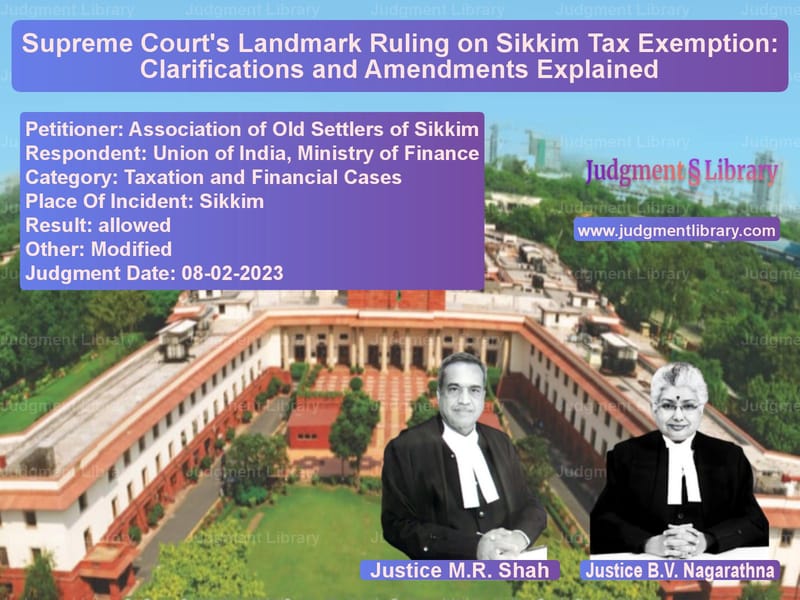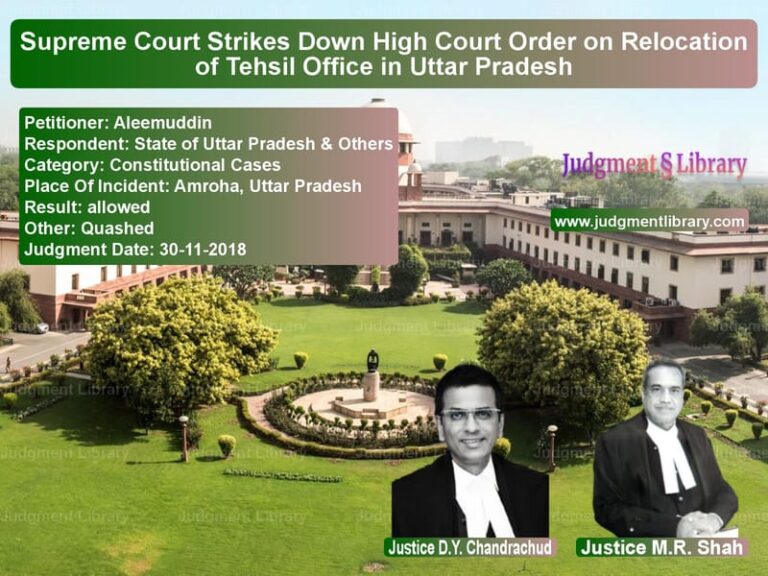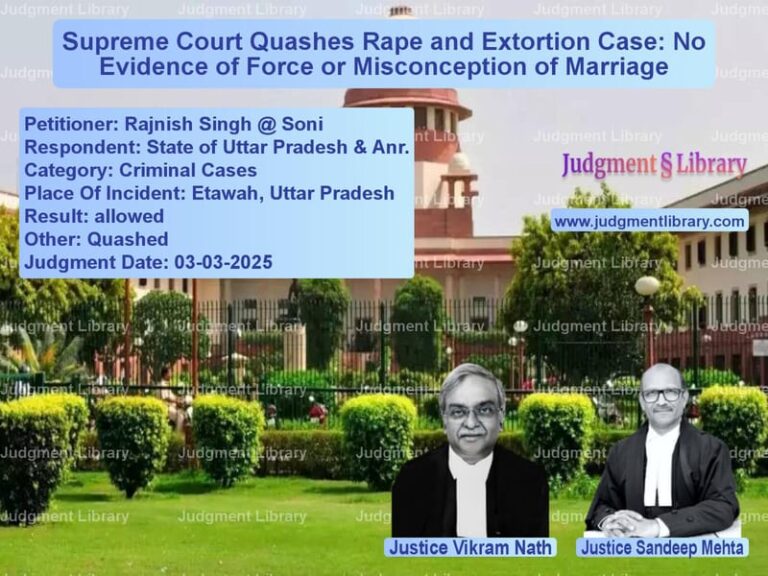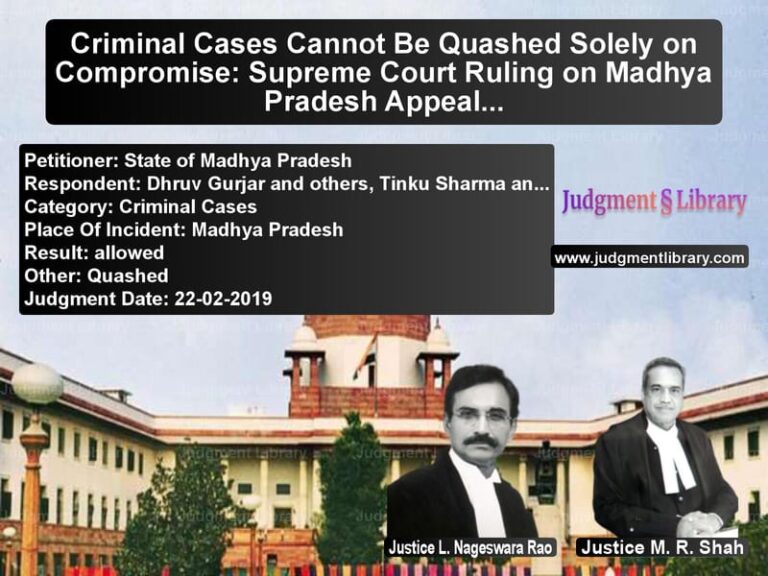Supreme Court’s Landmark Ruling on Sikkim Tax Exemption: Clarifications and Amendments Explained
The case involving the Association of Old Settlers of Sikkim versus the Union of India is a significant legal matter concerning tax exemptions under Section 10(26AAA) of the Income Tax Act, 1961. The judgment of the Supreme Court addressed the concerns raised by the petitioners, particularly regarding the discriminatory provisions that denied tax benefits to a group of long-time residents of Sikkim. This decision has far-reaching implications on taxation laws and constitutional interpretation related to special provisions for Sikkim.
Background of the Case
The dispute arose over the classification of individuals eligible for tax exemptions in Sikkim. Section 10(26AAA) of the Income Tax Act, 1961, grants tax exemptions to certain ‘Sikkimese’ individuals. However, this provision did not extend the same benefits to old settlers of Sikkim—people who had been living in the state for generations but were not categorized as ‘Sikkimese’ under the Sikkim Subjects Regulations, 1961.
The petitioners contended that this distinction was arbitrary and discriminatory, as it denied equal benefits to individuals who had lived in Sikkim for decades and contributed to its development. They sought the Court’s intervention to ensure that tax exemptions were granted to all deserving residents of the state without unjust exclusions.
Petitioners’ Arguments
The petitioners, represented by the Association of Old Settlers of Sikkim, presented the following arguments:
- They argued that the provision violated Article 14 of the Constitution, which guarantees equality before the law. The exclusion of old settlers from tax benefits was arbitrary and lacked a rational basis.
- They highlighted that these settlers had resided in Sikkim for decades, integrating into the local community and contributing to the state’s economic and social fabric.
- The petitioners emphasized that the differentiation between ‘Sikkimese’ and other long-time residents was unjust and unconstitutional.
- They contended that denying tax exemptions to certain residents amounted to economic discrimination, creating disparities among individuals residing in the same geographical territory.
- They also pointed out that the law failed to consider the historical context of migration and settlement in Sikkim, which had led to a diverse population that should not be divided arbitrarily.
Respondents’ Arguments
The respondents, representing the Union of India and the State of Sikkim, countered these claims with the following arguments:
- They argued that the provision was designed to protect the rights and privileges of indigenous Sikkimese people who had historically enjoyed special benefits under the Sikkim Subjects Regulations, 1961.
- The respondents contended that the law was aligned with Article 371-F of the Constitution, which provides special provisions for Sikkim and preserves the rights of its original inhabitants.
- They maintained that granting tax exemptions to old settlers would dilute the special status accorded to the indigenous Sikkimese community.
- The respondents further stated that any modification of the law should be made by the legislature and not through judicial intervention.
Key Observations by the Supreme Court
The Supreme Court carefully examined the arguments presented by both sides before arriving at its conclusions. The key observations made by the Court included:
- The Court acknowledged that the Explanation to Section 10(26AAA) was discriminatory against old settlers of Sikkim and needed rectification.
- It noted that tax exemptions should be extended to all deserving residents, irrespective of their classification under the Sikkim Subjects Regulations.
- The Court emphasized that the provision of tax exemptions should not create unnecessary distinctions among people who had been residing in Sikkim for generations.
- It ruled that the benefit of tax exemptions should be granted from the date the Explanation was inserted into the Income Tax Act.
- The Court clarified that its ruling did not affect the validity or interpretation of Article 371-F, which grants special status to Sikkim.
- It further observed that while the Sikkim Subjects Regulations, 1961, had been repealed, they remained relevant in defining ‘Sikkimese’ under the Income Tax Act.
Judgment
The Supreme Court ruled in favor of the petitioners and directed the deletion of discriminatory phrases from the Income Tax Act. The judgment also clarified that this ruling did not question the broader constitutional status of Sikkim or the special privileges granted under Article 371-F.
Furthermore, the Court explicitly stated that its decision should not be misinterpreted as an attempt to redefine ‘Sikkimese’ status beyond the scope of tax exemptions. It reaffirmed that the judgment was solely focused on ensuring non-discriminatory application of tax benefits.
Implications of the Judgment
This ruling has significant implications for taxation laws and constitutional interpretation:
- It sets a precedent for future cases where tax exemptions or other financial benefits are granted based on residency or ethnic identity.
- The judgment reinforces the principle that tax laws should not arbitrarily exclude certain groups without a valid and rational basis.
- It highlights the importance of ensuring that tax policies are aligned with constitutional provisions that uphold equality and fairness.
- The ruling also ensures that long-time residents of Sikkim are not unfairly burdened by tax obligations while others in the same community receive exemptions.
Conclusion
The Supreme Court’s ruling in this case serves as a landmark decision in taxation jurisprudence and constitutional law. By addressing the concerns of old settlers in Sikkim, the Court has reaffirmed its commitment to ensuring that all Indian citizens are treated equally under the law.
While the judgment upholds the special status of Sikkim under Article 371-F, it also ensures that economic rights are not undermined by arbitrary exclusions. This case underscores the necessity of a balanced approach that respects historical privileges while ensuring justice and fairness in tax policies.
Petitioner Name: Association of Old Settlers of Sikkim.Respondent Name: Union of India, Ministry of Finance.Judgment By: Justice M.R. Shah, Justice B.V. Nagarathna.Place Of Incident: Sikkim.Judgment Date: 08-02-2023.
Don’t miss out on the full details! Download the complete judgment in PDF format below and gain valuable insights instantly!
Download Judgment: association-of-old-s-vs-union-of-india,-mini-supreme-court-of-india-judgment-dated-08-02-2023.pdf
Directly Download Judgment: Directly download this Judgment
See all petitions in Income Tax Disputes
See all petitions in Tax Refund Disputes
See all petitions in Tax Evasion Cases
See all petitions in Banking Regulations
See all petitions in Customs and Excise
See all petitions in Judgment by Mukeshkumar Rasikbhai Shah
See all petitions in Judgment by B.V. Nagarathna
See all petitions in allowed
See all petitions in Modified
See all petitions in supreme court of India judgments February 2023
See all petitions in 2023 judgments
See all posts in Taxation and Financial Cases Category
See all allowed petitions in Taxation and Financial Cases Category
See all Dismissed petitions in Taxation and Financial Cases Category
See all partially allowed petitions in Taxation and Financial Cases Category







